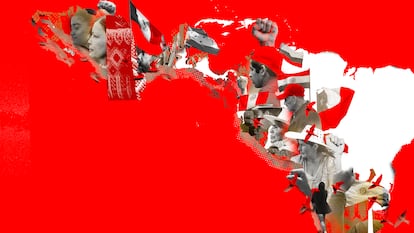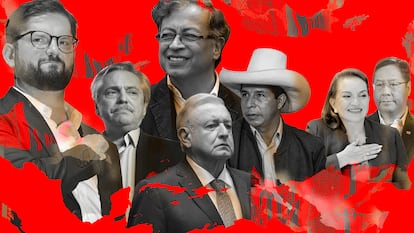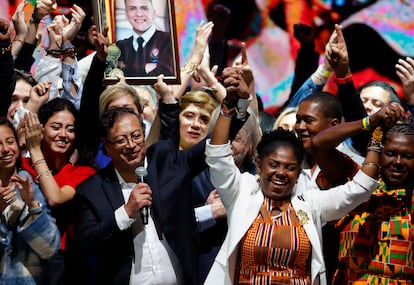Latin America looks to a new left
Mexico, Argentina, Chile, Peru, and now, Colombia. Five of the most powerful economies on the continent will be in the hands of progressives. A commitment to democracy, feminism and environmentalism marks the new agenda

The left has risen to power again in Argentina, Bolivia and Honduras, countries that have recovered from great blows, and now intend to moderate themselves after a great many internal problems. Among the nations that never imagined a leftist victory is Chile, and most surprisingly of all, Colombia; both heirs to annihilated leaders. There’s also a great deal of gibberish that proclaims itself to be progressive but is full of ifs and buts, such as the rhetoric of Peruvian schoolmaster Pedro Castillo and that of Mexico’s Andrés Manuel López Obrador. This mishmash of leftists has colored Latin America in red like never before.
As we wait to see what will happen at the end of the year in Brazil, where Lula da Silva may return to power, the other five strongest economies in the region —Mexico, Argentina, Chile, Colombia, and Peru— are governed, or will be from August 7, with the inauguration of Gustavo Petro, by presidents who like to think of themselves as being on the left. The advance of progressive governments can be traced back to the wave at the beginning of the century, when, championed by an unstoppable Hugo Chávez in Venezuela and in the eternal shadow of Cuba’s Fidel Castro, several countries aligned themselves around what was termed 21st century socialism.

The driving factors of the latest progressive victories are, paradoxically, the result of their differences with the first wave. If, at the beginning of the century, the price of raw materials and the oil boom were decisive in sustaining those governments, the engine of change now arises from the deterioration of social indicators in almost the entire region, driving the social upheaval of 2019, which the pandemic only exacerbated. Opponents have also contributed to recent wins. When not openly far-right, they have radicalized the more traditional right-wing, and as a result the left has been seen, in a way, as part of the establishment, says sociologist Luciana Jáuregui. She cites the example of José Antonio Kast, who put law and order and family at the top of his campaign platform in Chile; Keiko Fujimori, daughter of the old autocrat Alberto Fujimori, in Peru; the most recent case of the demagogue and businessman Rodolfo Hernández in Colombia, and the rise of the right-wing deputy Javier Milei in Argentina.
‘Faced with far-right groups, the left was seen almost as part of the establishment.’
Another one of the great differences is that none of the leaders of the recent past is alive or or in power, and popular mobilization has given way to electoral victories in which broad consensus has been necessary, as seen in Chile and Colombia. Even Lula, the only survivor from that era who could return to power, has sought an important ally in the political center, Geraldo Alckmin, a center-right heavyweight whom he defeated in the 2006 presidential elections. “There are no longer any historical leaders of the anti-neoliberal movement of the 1990s that connected the so-called socialism of the 21st century with real Cuban-style socialism,” argues the historian of the Colegio de México Rafael Rojas, referring to the Castro brothers, Hugo Chávez and Bolivia’s Evo Morales. “The new governments and leftist leaders, such as López Obrador, Fernández, Petro and Boric, are committed to preserving the democratic constitutional framework or moving away from re-electionism. The greater commitment to democracy in this new wave of the left can help contain the advance of authoritarianism, which has one of its main flanks in the Bolivarian axis,” alluding to a loose group including, though not only, Venezuela, Ecuador, Bolivia and Cuba.
If there is a watershed between the agendas of the beginning of the century and the current ones, it centers around feminist and environmental demands, with Argentina, Chile and Colombia at the forefront, in contrast to Mexico, where the government can’t keep pace with women activists fighting against the living hell of femicides in Mexico. To this, the Argentine philosopher Luciana Cadahia adds “the historical debt with Black movements.” Rojas recalls that the rights of indigenous people where the least progress is being made in the Bolivarian zone, and is promoted as “radical” or “socialist,” except perhaps in Bolivia.
‘In the search for a leader who unites all the forces in the region, Gustavo Petro emerges.’
Trying to explain the entire amalgamation of progressive forces as one common entity is absurd. There is perhaps more discrepancy than consensus in the proposals. In economic matters, as Rojas points out, the disaccord is most notable. Indeed, the plans of Andrés Manuel López Obrador are practically antagonistic to those of Gustavo Petrol, someone in favor of ending extractivism in energy matters and implementing a progressive tax reform. How these forces are going to relate to each other and to the rest of the world is also somewhat uncertain. “The greatest tension that we will see in the coming years will be, once again, between the realistic and multilateral vision of international relations promoted by progressives and the geopolitical strategy of the Bolivarian pole,” summarizes the academic from the Colegio de México. For this Cuban historian, a victory for Lula in Brazil would accentuate this tension, “since, both as a president and as an opponent, Lula has maintained a diplomatic line different from that of Cuba and Venezuela.”
No single victory creates a cycle, and for Manuel Canelas, who was part of the third government of Evo Morales in Bolivia, this idea is extremely pertinent. “To define a cycle, the number of electoral victories is not a sufficient condition,” says this former minister of communication, now based in Spain, who recalls the triumphs -not all at the polls- of the right between 2015 and 2017, “and yet there was no talk of a conservative cycle.” He further explains: “The idea of a cycle is more closely related to the construction of hegemony. One can win an election and govern without being hegemonic, so it can last less”. Jáuregui elaborates: “Ideological consensus and political alignments are being reconfigured with uncertain results. The left today, unlike the first progressive wave, assumes a defensive character aimed at preserving moderate changes that are promoted by the State rather than by popular mobilization. If one looks at recent processes, the victories of leftist or center-left governments do not translate into political and ideological dominance, but into politically and economically constrained governments, with difficulties in promoting a policy of transformation and even in guaranteeing their own internal cohesion.”

The management of the relationship with Cuba, Nicaragua and Venezuela, especially with the latter country, is going to be a headache for the new government leaders. All of them, including Petro and Boric, have distanced themselves from the authoritarian tendencies and human rights violations by Nicolás Maduro despite the fact that not so long ago they celebrated Chavismo. However, it would be naïve to think that there will be no changes in the relationship, for example, of Colombia or Chile with Venezuela, considering that millions of Venezuelans have gone into exile in both countries. Petro has already assured that one of his first priorities will be the reopening of the border with Venezuela.
The search for a leader who can unite all these forces seems inevitable. The figure of the Colombian president is emerging at the regional level with more drive than the enthusiasm generated by the rise of Boric in Chile or the leading role that López Obrador has sought in recent months. The philosopher Luciana Cadahia has no doubt that the triumph of the Historical Pact places Colombia as the new regional leader, to the extent that it can integrate most of the region, both on the Atlantic and Pacific sides. And she points to three historical debts that Colombian progressivism will place at the center of the debate: “The energy transition from the extractive fossil economy to a new sustainable model; the central role of the Caribbean and of Afro-Americans, indigenous people and popular urban sectors in political matters, and a new hemispheric pact that does not imply either leadership by the United States or a rejection of that country as a key player in the continent.”
‘Climate change is the new axis on which Latin America’s relationship with the United States will revolve.’
How the relationship with the great power will be articulated will surely mark a large part of the agendas between the different forces. Joe Biden suffered a setback at the last Summit of the Americas, in which he barely achieved a series of generic agreements and was snubbed by Mexico’s López Obrador, who did not attend because Cuba, Venezuela and Nicaragua were not invited. Mexico has insisted on the need to build a new path in the relationship between Latin America and the United States; practically a a sine qua non condition will be a reduced prominence of the Organization of American States (OAS) and its general secretary, Luis Almagro, whom the majority of progressive forces are turning their backs on.
It is around one of Joe Biden’s big pledges, however, that Latin America’s new relationship with the United States may revolve. The fight against climate change is not among López Obrador’s priorities, but it is among Petro’s. The quick congratulations that the Colombian received from Biden, just 48 hours after his victory, is significant. From a starting point of environmental policymaking, both want to reverse the irregular drug trafficking policies of recent decades. A reconstruction of the relationship between the United States and Latin America through the environment would instigate the greatest geopolitical change in the region in the century.
Tu suscripción se está usando en otro dispositivo
¿Quieres añadir otro usuario a tu suscripción?
Si continúas leyendo en este dispositivo, no se podrá leer en el otro.
FlechaTu suscripción se está usando en otro dispositivo y solo puedes acceder a EL PAÍS desde un dispositivo a la vez.
Si quieres compartir tu cuenta, cambia tu suscripción a la modalidad Premium, así podrás añadir otro usuario. Cada uno accederá con su propia cuenta de email, lo que os permitirá personalizar vuestra experiencia en EL PAÍS.
¿Tienes una suscripción de empresa? Accede aquí para contratar más cuentas.
En el caso de no saber quién está usando tu cuenta, te recomendamos cambiar tu contraseña aquí.
Si decides continuar compartiendo tu cuenta, este mensaje se mostrará en tu dispositivo y en el de la otra persona que está usando tu cuenta de forma indefinida, afectando a tu experiencia de lectura. Puedes consultar aquí los términos y condiciones de la suscripción digital.









































